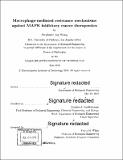Macrophage-mediated resistance mechanisms against MAPK inhibitory by cancer therapeutics
Author(s)
Wang, Stephanie Joy.
Download1127385355-MIT.pdf (11.71Mb)
Other Contributors
Massachusetts Institute of Technology. Department of Biological Engineering.
Advisor
Douglas A. Lauffenburger.
Terms of use
Metadata
Show full item recordAbstract
Kinase inhibitors targeting the MAPK pathway are often limited by lack of durable clinical responses or, in many cancer types, lack of even initial responses. While great headway has been made on characterizing mechanisms of resistance, understanding the full influence of complex intercellular interactions on drug resistance remains a challenge. Here, we combine computation with experiment to investigate the cellular and molecular contributions of the tumor microenvironment to MAPK inhibitor response. First, we employ a computational framework using published bulk and single-cell patient gene expression data to investigate immune cell correlates of MAPK inhibitor resistance, and subsequently quantify potential intercellular ligand-receptor interactions between cell populations of interest. Next, we use multiplex proteomic immunoassays and co-culture experiments to characterize the impact of these interactions on tumor-intrinsic bypass signaling and phenotype. To assess the in vivo relevance of these multicellular and multidirectional signaling networks, we develop an intravital imaging strategy to monitor the influence of tumor-associated macrophages on cancer cell kinase activity dynamics. Finally, we rationally design a nanotherapy to exploit inhibitor-induced immunomodulation and crosstalk. Overall, we present a paradigm to systematically dissect signaling pathways between tumors and their microenvironments, validate these interactions in various models of disease, and design therapeutic strategies to target them.
Description
Thesis: Ph. D., Massachusetts Institute of Technology, Department of Biological Engineering, 2019 Cataloged from PDF version of thesis. Includes bibliographical references (pages 93-108).
Date issued
2019Department
Massachusetts Institute of Technology. Department of Biological EngineeringPublisher
Massachusetts Institute of Technology
Keywords
Biological Engineering.